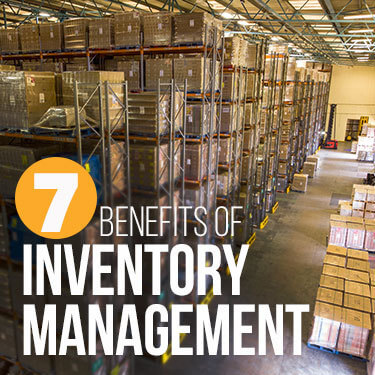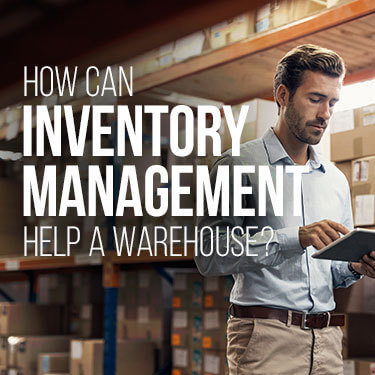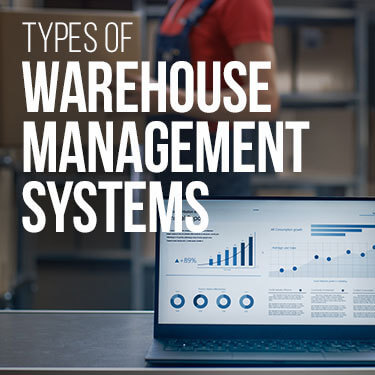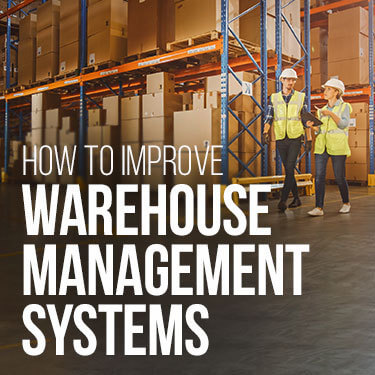
 Copy URL to Clipboard
Copy URL to Clipboard
Inventory management might seem like another added responsibility to the everyday functions of running a warehouse. While this is true, there are many benefits of inventory management that help warehouses run more effectively. But the question remains, what is inventory management?
As logistics professionals, we’ve found that some of the top benefits of inventory management for warehouse operations include:
Inventory management ensures that your freight is handled as efficiently as possible when it reaches the warehouse. This article will inform you about everything you need to know regarding this software and its uses.
Table of Contents
Many aspects are involved in running a warehouse. Ensuring that a warehouse runs efficiently can be difficult to do because of how many overwhelming these tasks have to be completed.
Warehouse tasks include receiving, storing and tracking inventory. Proper inventory management helps warehouse workers better perform these tasks to an efficient level.
Want to know about other forms of inventory management? Find out how decoupling inventory could work for your business.
To foster a good understanding of inventory management it's important to understand the different types of inventory. There are a total of five different types of inventory that will be handled inside a warehouse. Those types of inventory are:

Effective inventory management can provide numerous benefits to day-to-day warehouse operations. Here are some of the most common improvements that warehouses experience when they start using these systems.
Inventory management systems help warehouses track and store freight. Once freight has entered a warehouse its information is saved by the system.
When the freight is moved around the warehouse the management system will track its movements which will help prevent losing it. Additionally, inventory management systems can find free space in your warehouse. This makes it easier to find some space to store the freight that you have.
Despite how large they are, there is only so much room a warehouse has to store inventory. Efficiently utilizing space is important yet it leaves many warehouse workers feeling like they’re solving a puzzle.
Robust inventory management systems help these warehouse workers better utilize the space they have available to them. Using space in a warehouse will lead to cost savings because inventory won’t have to be moved around repeatedly.
While warehouses are large, there is only so much space for pallets to be stored. The average warehouse has about 264,860 feet of storage. The table below shows how much space the most common pallet dimensions would take up in an average warehouse.
| U.S. Pallet Dimensions | Pallets Per Average-Sized Warehouse |
| 48 x 48 | 16,552 |
| 42 x 42 | 18,917 |
| 40 x 48 | 19,913 |
The average warehouse can fit many pallets within it. Inventory management helps keep the pallets and the inventory on them organized in an efficient and safe way.
One of the most important things about running a warehouse is knowing the current stock levels. Inventory management systems allow warehouse workers to know the amount of inventory they have.
Live inventory data also tells warehouse workers how long inventory has been stored. Lastly, inventory management data allows for inventory tracking.
As a third-party logistics provider (3PL) performing order fulfillment, it is extremely important not to lose the inventory that belongs to customers. Tracking the inventory while it is in the warehouse allows it to be easily found when it’s time for it to be shipped out.
This particular benefit of inventory management piggybacks off using real-time data. The use of real-time inventory data allows warehouse workers to better locate inventory in the warehouse.
This means that warehouse workers won’t have to worry about searching for inventory that has been misplaced. Thanks to real-time data, there will always be an accurate inventory count.
An accurate count on inventory reduces the workload of workers because they won’t have to worry about keeping an inventory count on items while performing their inventory duties.
Mistakes inevitably happen in warehouse operations and fixing those mistakes requires resources to fix them. With inventory management systems, those mistakes are kept to a minimum because of the accuracy of the software.
Fewer mistakes mean that large amounts of money will have to be spent on resources to fix them. Inventory management systems also help keep labor costs down.
Since inventory management systems reduce the workload for warehouse personnel, warehouses don’t need large teams that perform a larger array of tasks. Rather, smaller teams whose tasks are more narrow and specialized are required.
Inventory management software helps warehouse operations become more organized. Efficiently stored products, clearly defined roles for warehouse personnel and a minimized amount of mistakes will keep a warehouse in working order.
Another great benefit of inventory management systems is that they allow companies to predict future demand accurately. Knowing future demand allows companies to prepare and stock their warehouses full of goods that they know customers will want in the future.
When stocking inventory, it's important to never have too little or too much of a certain product. Having too little of a certain product means customers will have to wait until you are restocked, whereas having too much will waste space in the warehouse.
The accuracy of inventory management systems will help your warehouse keep an accurate balance of goods that are available for customers.

There are many types of warehouse management systems (WMS) that third party logistics companies use to keep track of inventory in their warehouses. There are three main system types that 3PLs use to keep track of inventory in their warehouse.
The system types are:
The standalone WMS is simple but specialized. Its purpose is simply to assist with inventory management and the routine operations of a warehouse. They can also be used to monitor the supply chain flow of goods as they go to and from the warehouse.
A standalone WMS can provide the following services:
Unlike standalone WMS, the supply chain modules perform a larger amount of functions. Not only do supply chain modules automate inventory management, but they also help with vendor relationships, business decisions and assessing risks.
Pairing a supply chain module with a standalone WMS is extremely beneficial. That is because it combines the functions of both to create a more cohesive and robust warehouse management system.
Before we discuss the features of this particular type of management system, we will explain what ERP is. An ERP is a type of software that allows companies to manage their accounting and other types of operations they conduct.
Some of the functions that an ERP system offers are:
Many ERP systems do offer services that can aid in warehouse management. However, ERP systems do not specialize in this feature or any other.
The ERP system is well-rounded but does not focus on any particular type of function. Instead, ERPs are broader in the functions that they perform. Pairing an ERP system along with a standalone WMS will counteract this shortcoming.
For more information about warehouse management systems, check out our article about how to keep track of inventory inside a warehouse.

Inventory management isn’t the only method that will contribute to a warehouse running at peak efficiency. There are a few other ways that inventory management can be improved.
One important feature of running a warehouse is quality control. Proper quality control is essential to correcting mistakes before a package leaves the warehouse. This will also prevent customers from being upset with 3PLs services.
Other aspects of keeping proper inventory management include choosing the right vendor, formulating project plans, and many other features. On our site, we have an entire article outlining all of the important aspects of managing a warehouse.
At R+L Global Logistics, we know the benefits of inventory management systems firsthand because we use them ourselves. All the benefits of inventory management systems that we have, you as a customer will have as well.
Specifically, R+L Global Logistics uses both WMS and ERP software to keep track of all inventory and fulfillment operations within its warehouses. With these software programs, we can keep track of any inventory that we receive.
Rest assured, when you use R+L Global Logistics warehousing and order fulfillment services, you won’t have to ever worry about us losing your goods. Supply chains are hard enough to keep running and the last thing you need is for fulfillment services to make it harder.
Take advantage of R+L Global Logistics fulfillment and warehousing services today by starting your free warehouse quote on our site.
